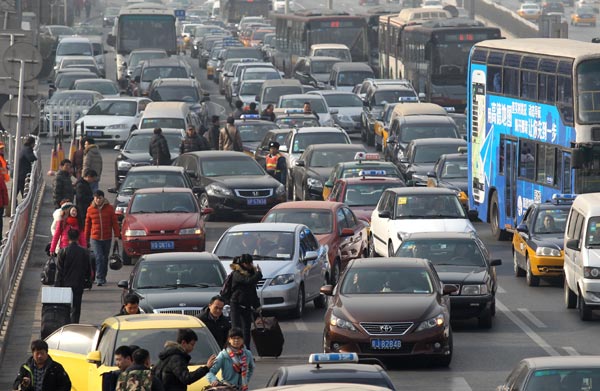BEIJING - Beijing will curb explosive population growth by tackling complicated urban problems, Mayor of the city Wang Anshun has said.
"Becoming a modern international metropolis, Beijing is challenged by an urban disease which consists of a complex mixture of problems," said Wang at the ongoing annual session of the Municipal People's Congress, Beijing's legislature.
 |
|
Drivers taking passengers to Beijing West Railway Station resort to impromptu parking on Jan 16, triggering traffic congestion on the first day of the annual Spring Festival travel rush. [Photo by Zhu Xingxin/Asianewsphoto] |
Wang made the remarks while delivering a government report on Thursday, as smog enveloped the city.
The metropolis is in a development dilemma because of smog, traffic jams, strained resources and population growth.
"We can not turn a blind eye, but take practical measures in mapping out the city's keys functions, and optimize the allocation of resources," said Wang.
The capital will restructure industries and upgrade service sectors to slow down population growth.
To curb population growth, Beijing will amend its industry and employment policies.
The city will implement a residence certificate system targeted to strengthen floating population registration and the overall service management system for its actual population, said Wang.
Since 2000, Beijing's permanent population has increased by an average of nearly 600,000 annually to reach 20.69 million at the end of 2012, far exceeding the planned target of keeping it at 18 million by 2020.
Beijing's population is about 2.6 times that of London and 2.5 times bigger than New York.
Population growth is blamed for the city's problems.
The crux of the problem lies in its central area with the concentration of functions, said Wang Fei, the deputy director of Beijing Municipal Commission of Urban Planning.
Downtown Beijing is a cluster of political, economic and cultural functions, with both high quality public services and enterprises.
Even worse, these functions are badly conflicted. "We will move people by relocating public services and jobs to the outskirts," said Cheng Lianyuan, an official with Chaoyang District.
The capital will move several small commodity markets and large-scale hospitals outside from the downtown area.
It will also force 300 polluting companies to change and eliminate coal-burning boilers inside Beijing's fifth ring road.
The city is expected to ease its urban problems through urban-rural integration and autonomous population flow, said Wang.
|
|
|
|
|
|
|
|
